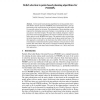48 search results - page 5 / 10 » Approximate Planning in POMDPs with Macro-Actions |
108
click to vote
AAAI
2008
15 years 2 months ago
2008
In order to interact successfully in social situations, a robot must be able to observe others' actions and base its own behavior on its beliefs about their intentions. Many ...
112
click to vote
JAIR
2008
14 years 11 months ago
2008
Decision-theoretic planning is a popular approach to sequential decision making problems, because it treats uncertainty in sensing and acting in a principled way. In single-agent ...
105
click to vote
AI
2006
Springer
15 years 3 months ago
2006
Springer
Abstract. Current point-based planning algorithms for solving partially observable Markov decision processes (POMDPs) have demonstrated that a good approximation of the value funct...
98
Voted
ATAL
2010
Springer
15 years 23 days ago
2010
Springer
Memory-bounded techniques have shown great promise in solving complex multi-agent planning problems modeled as DEC-POMDPs. Much of the performance gains can be attributed to pruni...
AIPS
2008
15 years 2 months ago
2008
We consider the problem of cooperative multiagent planning under uncertainty, formalized as a decentralized partially observable Markov decision process (Dec-POMDP). Unfortunately...

